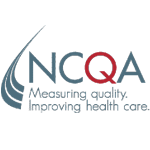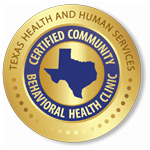
“When our clients come to Metrocare, it is primarily to tackle a mental health challenge they are experiencing,” McKenna Steck, Clinical Manager III at Metrocare, explains. “But in reality, we have to recognize their mental health is impacted largely by additional factors, like their job, family, finances, or whatever else they have going on in their life. Just because we give them therapy and medication, that doesn’t take away all their problems.”
When asked to describe the role of a Care Coordinator, McKenna led with this important, but often-overlooked, realization. Mental health doesn’t live in a vacuum – it is regularly influenced by physical, biological, and social factors beyond an individual’s control. In her role at Metrocare, McKenna oversees a large team of Care Coordinators, who all have this understanding at the forefront of their minds when dealing with clients.
“Our clients come in with other needs, like income or housing, and they need someone to point them in the right direction. They need resources, and that’s where we come in,” McKenna continues. “Our Care Coordinators really go above and beyond. They don’t just hand someone a resource list or give them a phone number to call. We make phone calls alongside them. We transport them if they need it. We may go to the Dallas Housing Authority or the Social Security offices with them. We advocate for our clients and ensure that they get connected to the right people.”
Care Coordination is a significant part of Metrocare’s relatively new Satellite Clinic Program, which was born from the realization that we can reach more people by meeting them where they are and by harnessing the strength of our community partnerships.
Currently, Metrocare operates over 20 satellite clinics across Dallas County, strategically located to serve diverse communities. These clinics allow us to join forces with other organizations to provide our services to both their audience and the public. At each location, a dedicated Care Coordinator is onsite during various hours throughout the week, ready to assist any member of the community who walks in.
When someone walks into one of our satellite clinics for mental health support, our Care Coordinator conducts a financial assessment and guides them through the intake paperwork. From there, they identify any additional resource needs, like housing or employment, before scheduling a telehealth appointment with our Metrocare provider, Dr. Harris. Oftentimes, we’re able to provide immediate same-day support, regardless of a person’s inability to pay.
The beauty of our satellite clinics lies in their ability to deliver direct mental health support to a broader population, providing more of our services in more zip codes.
“We are reaching the people who are hardest to reach. Like the people who don’t have transportation, money for bus fare, or a phone. We regularly see adults and children who are living on the streets, or who have just fled a domestic violence situation,” McKenna says. “Having these satellite locations allows us to further dig into the community and reach the people who can’t get to one of our clinics as easily.”
The Satellite Clinic Program capitalizes on a fundamental truth, not just in this context but in mental health as a whole: we can’t do it alone. The ability to partner with incredible organizations allows us to enhance the holistic support for our clients, while also extending mental health services to theirs. This collaboration is as imperative as it is rewarding.
For example, in February 2024, Metrocare started collocating with After8toEducate to provide our services onsite at their youth center on Wednesdays from 2:30 to 4:30 p.m. After8toEducate is an organization tackling the most vulnerable population of unsheltered high school students, of which there are over 4,000 in the Dallas Independent School District. One of their clients learned Metrocare would be onsite and stopped by one day.
“Here was his situation – he was homeless and had dropped out of high school due to bullying. In his intake, he reported feeling depressed, having poor concentration and self-esteem issues, as well as family problems,” McKenna begins. “For a young adult to be going through all of those things, it was tough to hear.”
She continues, “We find a lot of younger people aren’t as enthusiastic about going to a doctor’s appointment, and he was not someone who would have been able to get to one of our main clinics. But since he heard we would be onsite at After8toEducate, we were able to see him. We’ve seen him several times since his first visit. He is now taking his meds, is no longer living on the street, is employed, and reports feeling better overall.”
This is just one example of the incredible impact these partnerships can have on our community. With Metrocare stepping in to provide essential mental health support and medication, and After8toEducate working diligently to secure stable housing, we were able to collaboratively help someone when they needed it most.
Stay connected
Sign up for our newsletter











